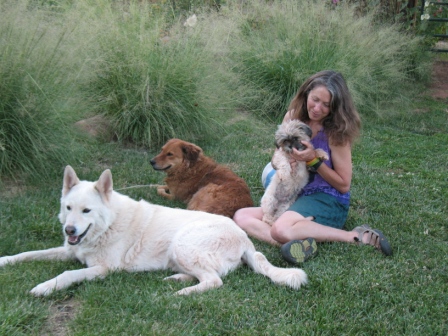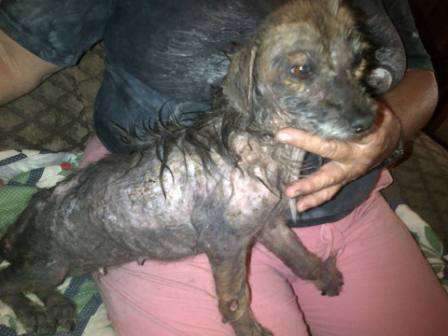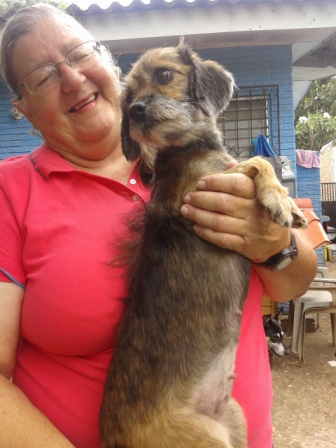
"I'M SOMEBODY WHO was born having this feeling about animals,” says Karen
Menczer, who was welcomed into the world by the family’s growling
Airedale Terrier. Like many lifelong animal-lovers, Menczer went on to
find countless abandoned animals on the streets and in the middle of
nowhere, sometimes even on her doorstep.
One of the first was Slim, an emaciated tan Shepherd mix with a broken
hip who collapsed outside her home in 1997. Menczer and her husband,
Ron Stryker, carried him to a veterinarian, and Slim became part of
their family.
The unusual part of this story is that Slim appeared within days of
the couple’s arrival in Kampala, Uganda, and Menczer already had
connected with the newly formed Uganda SPCA, so she knew one of the few
small-animal vets in the East African nation.
For more than two decades, Menczer and Stryker worked in some of the
poorest countries in the world as employees of the U.S. Agency for
International Development (USAID). Every place she was stationed,
Menczer volunteered with animal welfare groups, usually operating with
extremely limited resources.

When they returned to Jemez Springs, N.M., after her husband retired in 2007, Menczer found a way to make use of her connections, and created the nonprofit group Animal-Kind International. AKI connects American donors with small rescue groups in Africa, the Caribbean, Latin America, and Eastern Europe that desperately need resources and expertise.
“I’ve seen firsthand how much good these groups can do on shoestring budgets,” Menczer says of AKI’s partner organizations. “They’re so grateful for any supplies, and know how to make every dollar count.”
Pilar Thorn, who heads Helping Hands for Hounds in Honduras, confirms that Menczer and AKI have provided “moral support, encouragement, and advice and financial support to help with the rescue and treatment of abandoned dogs and cats”—which is clearly a great need in a place like Honduras, where even humans struggle with basic necessities. “This dependable, ever-present support makes a difference in the quality of the care I can give the animals, … and in the quantity of animals I can care for.

“Ever since meeting Karen,” Thorn adds, “I have felt like I am not alone.”
Among the ways that AKI donors have made a difference is helping to
build rain-harvesting tanks at a sanctuary for dogs in Malawi, where
water previously had to be hauled from the river; providing food and
sterilization for street dogs in Jamaica and Suriname; and funding a
caregiver for injured, traumatized animals at the Uganda SPCA shelter.
Menczer says animal welfare in developing countries is about 40 years
behind where it is in the United States. “Here in New Mexico, there are
about 200 animal welfare organizations, but the groups AKI supports are
often the only ones helping animals in their entire countries,” she
says.

Her work in animal rescue began in her early teens, when she joined
her mother as a volunteer at Animal Humane New Mexico. “Back then, there
was only one building and no clinic. I cleaned cages, played with
puppies, and walked dogs,” she recalls. One of her early role models was
Thelma Evans, who founded Animal Humane with her husband, Col. Edmund
Evans.
She continued volunteering at Animal Humane while at the University of
New Mexico, where she majored in ecology. After graduate school at
Indiana University, she began her career in biodiversity conservation
with USAID in 1991.
Her first postings took her to Latin America, where she was shocked by
the widespread animal abuse and neglect. “People would kick stray dogs,
throw rocks at them, and worse.” Every place she worked, Menczer would
find people who were helping animals, and help them.
By the time she and her husband arrived in Uganda, Menczer was ready
to become more involved. She joined the board of the Uganda SPCA and
began organizing spay/neuter clinics at her home in Kampala. Founding
Animal- Kind International has allowed her to help animals in 11
countries: Armenia, Bosnia, Ghana, Honduras, Jamaica, Malawi, Namibia,
South Sudan, Suriname, Tanzania, and Uganda.
Why support animal rescue on the other side of the world when the need
is so great at home? Menczer, who also volunteers for Jemez Valley
Animal Amigos, believes “there’s room in our hearts to help
internationally as well as locally. For example, we may donate to our
local food bank, but also support famine relief in Africa.”
Donors to AKI can choose an individual group supporting dogs, cats,
horses, or donkeys in any of the 11 countries. All donations go directly
to the organizations; AKI’s board members take no pay.
“Our AKI partner groups do so much with so little,” she says. “They
work in countries where donations to animal welfare are so hard to come
by, and where American expertise and generosity can have a huge impact.
After all, kindness to animals has no boundaries.”
Information: www.animal-kind.org
Barbara
Castleman is a writer and public relations professional who lives in
Santa Fe with her husband Craig and three senior dogs. She has worked
for animal welfare groups based in Boston, London, and most recently at
Best Friends Animal Society in Kanab, Utah.
